 Petzlover
PetzloverChow Chow is originated from China but Doxiepom is originated from United States. Chow Chow may grow 24 cm / 10 inches higher than Doxiepom. Chow Chow may weigh 20 kg / 45 pounds more than Doxiepom. Chow Chow may live 3 years less than Doxiepom. Both Chow Chow and Doxiepom has same litter size. Chow Chow requires High Maintenance. But Doxiepom requires Moderate Maintenance
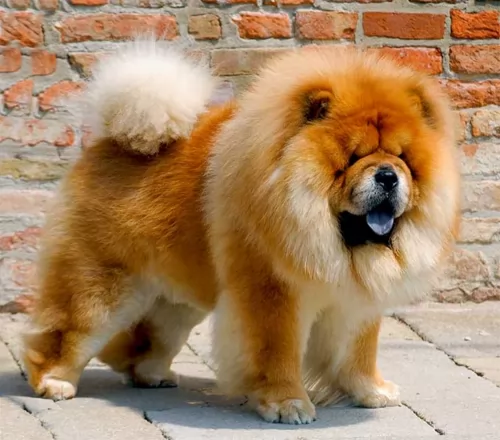 Northern China is the original home of the Chow Chow. In that region of China, the breed was known as the Songshi Quan – “the puffy-lion” dog. They have also been known in China as the “Dog of the Tang Empire” or the Tang Quan. The Chow is believed to be an ancient breed that the Foo Dog, or stone dog guardians of Buddhist palaces and temples, is modeled after. It is one of the most ancient of dog breeds that are still around today.
Northern China is the original home of the Chow Chow. In that region of China, the breed was known as the Songshi Quan – “the puffy-lion” dog. They have also been known in China as the “Dog of the Tang Empire” or the Tang Quan. The Chow is believed to be an ancient breed that the Foo Dog, or stone dog guardians of Buddhist palaces and temples, is modeled after. It is one of the most ancient of dog breeds that are still around today.
It is believed that they have existed for around 2000 years or perhaps even as far back as 3000 years, starting out in Mongolia and migrating to China. The ancientness of the Chow Chow has been validated through DNA testing. In China all those centuries ago, the Chow Chow was born to be a working dog. They hunted, herded, guarded and pulled carts. They went on quests with the Mongolian armies when China was invaded, as well as when the Mongolians invaded the Middle East and Europe later on.
Today’s Canadian Kennel Club has about 350 Chows registered while the AKC gets 10,000 new registrations every year.
The Doxiepom is a small dog known as a designer breed which has originated from crossing the well known Dachshund dog with another well known pure-breed dog, the Pomeranian.
This has resulted in the hybrid breed – the Doxiepom.
Both these pure bred dogs have their own history each but the Doxiepom is a new dog breed. It is believed that this mix of Pomeranian and Dachshund was originally developed in the United States in the 1990’s and while he doesn’t have much of a history, you can have a look at the history of the parent dog breeds.
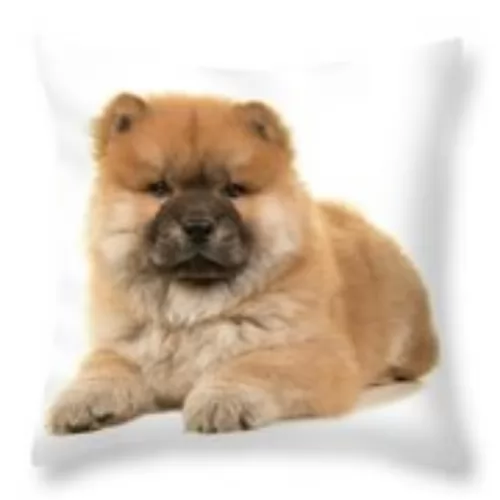 The Chow really does look like a small lion with a black tongue. The dog is sturdy and square with erect, small ears on a broad skull. They have a very dense double coat. Their eyes are deep set and look like almonds, while they all have that very distinctive purple or black tongue. Their lips are also distinctive with their blue color. The nose is black, but some Chows might have a blue nose. The tail is curly.
The Chow really does look like a small lion with a black tongue. The dog is sturdy and square with erect, small ears on a broad skull. They have a very dense double coat. Their eyes are deep set and look like almonds, while they all have that very distinctive purple or black tongue. Their lips are also distinctive with their blue color. The nose is black, but some Chows might have a blue nose. The tail is curly.
These are medium size dogs when it comes to height and weight, but they are powerfully built for their size. Their power is in their compact body holding the energy and strength of a much larger dog. Its hind legs are almost entirely straight, unusual for any dog. They get their lion appearance from the huge ruff that stands behind their heads. Their chest is broad and deep.
The Doxiepom is a small dog - a cross between the Dachshund and the Pomeranian, and this means he can have characteristics from each of these breeds.
They’re short dogs, standing at roughly 12cm to 27cm. A full grown Pomeranian Dachshund mix can weigh between 3kg and 12kg.
With a fairly long body from the Dachshund side, he has floppy ears or they can be semi-erect and the tail is long.
You can’t really say what the dog will look like exactly and the coat may be long or short with some of the coat colors being tan, black or brown.
Their dependent nature can mean these little dogs battling with separation anxiety, and he is a dog that doesn’t like being left alone for long periods of time.
He easily attaches himself to just one member of the family while being friendly and loving to everyone else as well.
They’e fun loving, playful dogs and want to be involved in their family’s activities, whether indoors or out. They’re friendly, but are aloof with strangers. He makes a great watchdog too, barking when strangers enter the property.
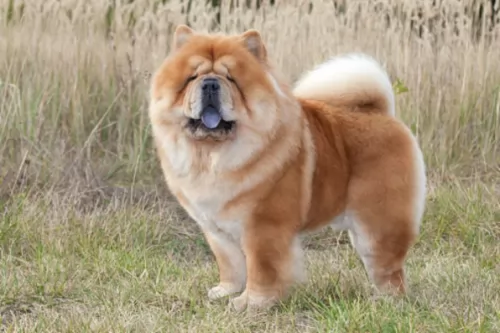 Loyal and true to their family and those they know; the Chow Chow is a little standoffish with strangers. They are very protective and usually attach themselves to one or two people. They are intelligent but stubborn, which can affect your training with them. They need to respect their people and Chows respect hose who take care of them. They can be aggressive toward dogs of their same sex especially if those dogs are the same breed as well.
Loyal and true to their family and those they know; the Chow Chow is a little standoffish with strangers. They are very protective and usually attach themselves to one or two people. They are intelligent but stubborn, which can affect your training with them. They need to respect their people and Chows respect hose who take care of them. They can be aggressive toward dogs of their same sex especially if those dogs are the same breed as well.
They are known to be very clean and many have compared them to cats in that regard. They appear to be dignified and refined. They are usually very quiet but very adaptable dogs.
One of the strong characteristics of the the Doxiepom is that he shares a strong bond with his human family.
He is such a amicable little dog, ready to join in with the children in their games as well as in the activities of the adults.
He craves human companionship, and if you provide him with a happy home, he promises to give you devoted companionship throughout his life.
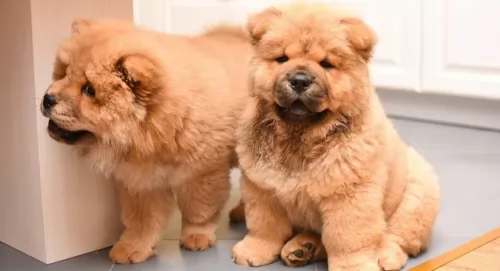 Although an ancient breed that obviously has survived many centuries of trials, the Cho Chow of today is prone to several different health conditions. These include:
Although an ancient breed that obviously has survived many centuries of trials, the Cho Chow of today is prone to several different health conditions. These include:
This condition can require surgery to keep the turning eyelid from injuring the eye ball.
This can cause lameness and arthritis.
This can cause lameness and arthritis.
Make sure you keep the ears clean and keep an eye on them.
The Doxiepom is a little dog who isn’t going to cost you a lot of time at the vet, however there are some typical dog illnesses that you will do well to know about.
Generally the Doxiepom has a lifespan of about 12 to 16 years and with good care, your pet can reach this age too.
As far as health problems go, your dog could be affected, although it is unlikely, as he is a robust dog breed.
Your pet could inherit health problems more common to either of the breeds. Little dogs suffer with their own set of heath problems and these could be back problems, dental- and eye disease and allergies.
A common health problem with a small dog like this is obesity. They don’t need a lot of food but because they’re so friendly and entertaining, some owners over-feed them.
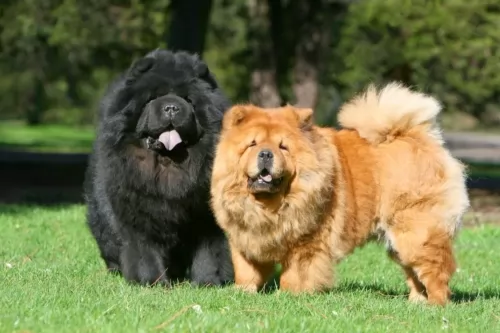 Don’t overfeed a Chow Chow as they are hard workers and big eaters. Feed them at least twice a day.
Don’t overfeed a Chow Chow as they are hard workers and big eaters. Feed them at least twice a day.
This eye disease can lead to blindness if not checked and treated.
These can be removed from an adolescent puppy.
Again, the Chow is susceptible to cancer.
Can lead to heart or kidney problems if left untreated.
Keep a close eye on your Chow Chow skin.
The Chow Chow was developed as working dog, but today’s version is more laid back and doesn’t need excessive exercise. Daily walks will suffice. They live very happily in the city if walked regularly. They are not really a competitive breed outside of obedience and confirmation. They are seldom seen in sports like agility or frisbee.
The Doxipom has moderate grooming requirements, shedding somewhat throughout the year, so brushing him twice a week will keep the coat shiny and healthy.
If your pet has turned out to have more long hair than short, he may require some professional grooming. His nails will also need clipping and his ears will also need to be checked for infection.
Small dogs often battle more with dental and gum problems, and plaque and tartar buildup results when food gets trapped between the teeth, leading to gingivitis which can lead to premature tooth loss. Keeping the teeth clean is therefore important.
Small dogs have quicker metabolisms than big dogs and they also mature faster than the larger dogs. Smaller dogs actually require more calories per kilogram than big dogs because they burn up energy faster than larger breeds.
It is therefore important to feed your small dog the right amount of food to support their growth rate and to maintain weight in adulthood. Homemade foods for your Doxiepom are always wonderful, but of course many people who work make use of some of the good commercially manufactured dog foods out of sheer convenience.
Go for the better quality brands which have top ingredients in them so as to avoid deficiencies.
Raw meat should also make up part of the diet – fish, chicken and red meat. Always make sure your pet has access to fresh, cool water.